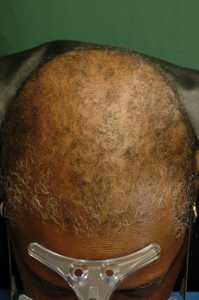
19 Feb Mutations Linked to Scarring Hair Loss in African American Women Identified
MedicalResearch.com Interview with:

Cicatricial Alopecia
Courtesy of Dr. Amy McMichael MD
The Department of Dermatology
Wake Forest Baptist Medical Center
Winston-SalemNorth Carolina
Eli Sprecher MD PhD
Professor and Chair, Division of Dermatology
Deputy Director General for R&D and Innovation
Tel Aviv Sourasky Medical Center
Frederick Reiss Chair of Dermatology
Sackler Faculty of Medicine
Tel Aviv University, Tel Aviv, Israel and
MedicalResearch.com: What is the background for this study?
Response: Central centrifugal cicatricial alopecia (CCCA) is a form of hair loss (alopecia) which is extremely common and affects one in every 20 women of African origin. It starts usually during the fourth decade of life. Because it can be inherited from mothers to their children, it is thought to have a genetic basis. On the other hand, it is known to mainly affect women who use to groom their hair intensively. Thus it was thought that the disease stems from some form of inherited susceptibility to the damage incurred to the hair follicle by grooming habits.
In the study we published, we searched for the genetic basis of CCCA.
In contrast with the common form of alopecia (androgenetic alopecia or female pattern alopecia), CCCA is associated with scarring of the scalp skin, which means that once hair is lost, it will likely not re-grow.
MedicalResearch.com: What are the main findings?
Response: We identified mutations in a gene called PADI3 in about 24% of a series of patients with CCCA. This gene codes for an enzyme which is necessary for proper hair formation. Using a number of approaches, we demonstrated that CCCA-causing mutations are affecting the function of this enzyme.
We know that this enzyme is essential for proper hair development because children who carry mutations on both copies of the PADI3 gene are affected by a severe hair disease known as the uncombable hair syndrome (the same disease which apparently affected Shockheaded Peter). In CCCA, most affected women have only one copy of the gene which is abnormal. We believe that the combination of intense hair grooming with defective activity of an enzyme essential for normal hair formation, is responsible for CCCA.
MedicalResearch.com: What should readers take away from your report?
The main lessons from this story are:
(1) Through the study of often ultra-rare disorders (e.g. uncombable hair syndrome), you can get insights into the cause of much more common conditions (e.g. CCCA)
(2) Disorders which we used to consider as “acquired” are often associated with an underlying genetic (inheritable) defect.
MedicalResearch.com: What recommendations do you have for future research as a result of this work?
Future research will focus on:
(1) Attempting at harnessing this new knowledge in order to design new therapeutic approaches for CCCA.
(2) Investigating the role of PADI3 in other forms of alopecia.
No disclosures
Citation:
VARIANT PADI3 IN CENTRAL CENTRIFUGAL CICATRICIAL ALOPECIA
Liron Malki, M.Sc., Ofer Sarig, Ph.D., Maria-Teresa Romano, M.Sc., Marie-Claire Méchin, Ph.D., Alon Peled, B.Med.Sci., Mor Pavlovsky, M.D., Emily Warshauer, M.D., Liat Samuelov, M.D., Laura Uwakwe, M.D., Valeria Briskin, Ph.D., Janan Mohamad, B.Med.Sci., Andrea Gat, M.D., et al
February 13, 2019 DOI: 10.1056/NEJMoa1816614
[wysija_form id=”3″]
[last-modified]
The information on MedicalResearch.com is provided for educational purposes only, and is in no way intended to diagnose, cure, or treat any medical or other condition. Always seek the advice of your physician or other qualified health and ask your doctor any questions you may have regarding a medical condition. In addition to all other limitations and disclaimers in this agreement, service provider and its third party providers disclaim any liability or loss in connection with the content provided on this website.
Last Updated on February 19, 2019 by Marie Benz MD FAAD
